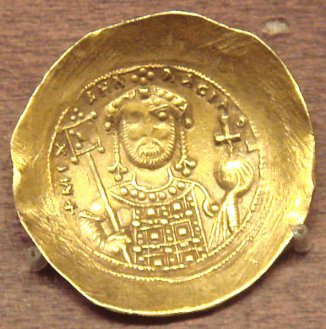|
|
|
Michael VII was the son of Constantine X Doukas and Eudokia Makrembolitissa, and was born in 1050, in
Constantinople.
When Constantine X died in 1067, Michael VII was 17 years old and should have been able to rule by himself. He exhibited little interest in politics, and his mother Eudokia and uncle
John Doukas governed the empire as effective regents.

Eudokia Makrembolitissa was the daughter of John Macrembolites and niece of Michael Cerularius, the patriarch of Constantinople.
On January 1, 1068, she married the general
Romanos IV Diogenes,
who now became senior co-emperor alongside Michael VII, Konstantios, and Andronikos.
When Romanos IV was defeated and captured by Alp Arslan of the Seljuk Turks at the Battle of Manzikert in August 1071, Michael VII remained in the background, while the initiative
was taken by his uncle John Doukas and his tutor Michael Psellos. They conspired to keep Romanos from regaining power after his release from captivity. After the dispatch of Eudokia
to a monastery, Michael VII was crowned again on October 24, 1071 as senior emperor.
Michael VII Doukas reigned from 1071 to 1078. He was Michael Psellos's student and it soon became apparent that he was unable to govern. He became a pawn in the
hands of the eunuch Nikephoros or Nikephoritzes, who had risen though the hierarchy and become omnipotent.
He acted within his own interests and was indifferent to the internal or
external state issues. It is worth mentioning the policy of the emperor regarding the production of wheat in Rhaidestos. There, he tried to nationalize trade and imposed a lien on part
of the quantity on sale. The lien was equal to one pinakion, namely 1/4 of a modius. For this reason the Emperor got the nickname Parapinakes.
In the reign of Michael VII, the administrative, military and economic situation of
Byzantium
went through a severe crisis.
Nikephoritzes increased both taxation and luxury spending without properly financing the army. Imperial
officials resorted to property confiscations and even expropriated some of the wealth of the church. The underpaid army tended to mutiny, and the Byzantines lost Bari, their last
possession in Southern Italy and Sicily, to the Normans of Robert Guiscard in 1071. Simultaneously, they faced the attacks of
Seljuks
in Asia Minor, who without resistance destroyed
and plundered
villages and towns, spreading the terror and creating huge waves of refugees who sought refuge in the capital of the empire.
Northern, the Byzantines suppressed a revolt led by Constantine Bodin with difficulty, while the Pechenegs and
the Uzes continuously invaded and sacked Byzantine territory south of Danube. The economic situation of the state was deteriorating and the result was a series of coup d'etats. The first
to rebel in 1077, was Nikephoros Bryennios. The leader of the coup d'etat, however, was Nikephoros Botaneiates, who overthrew Michael, forcing him to become a monk in the
Stoudios Monastery
and took his place on the throne.
This period was marked by great minds such as Michael Psellos, John Xiphilinos and John Mauropous.
Psellos was born in Constantinople in 1018 and despite the limited economic means of his bourgeois family received great
education and had an important
career in the hallways of the
Byzantine court. Imperial chancellor, chamberlain, prime minister and counselor of the king, he served in many ways the emperors that ascended to the throne from Constantine IX
Monomachos (1042) up to Michael VII Doukas (1071). The first emperor gave him the title of hypatos ton philisophon and the chair of the professor of philosophy in the superior
educational institute he created in Constantinople.
His vast work, includes studies in matters of theology, liturgics, philosophy and law. He took to the study and the
annotation of the ancient philosphers, mathematics, music and
astronomy. A very interesting work, evidence of his multifaceted mental inquietudes is the "Didaskalia Pantodape"
("Omnifarious Teaching"), which constitutes a short theological
and scientific disquisition that with 201 entries gives answers to significant questions
of the human existence.
Apart from his scientific disquisitions, he is considered to have written several works of literary interest, along
with many hundreds of epistles, poems, lectures, funeral orations and
encomia of eminent personalities of the times. Finally, his historiographic work "Chronography" covers the period 976-1077.

